AI-Enhanced Music: Unlocking New Creative Possibilities in 2025
- A.I. Kimiya Innocorn

- Apr 12, 2025
- 2 min read
Updated: Nov 18, 2025

The music industry is undergoing a radical transformation, fueled by artificial intelligence (AI). By 2025, AI is set to revolutionize how music is composed, produced, and experienced—blurring the lines between human creativity and machine intelligence. From AI-generated melodies to virtual pop stars, the future of music is being rewritten by algorithms.
How AI is Reshaping Music Creation
1. AI-Powered Composition & Songwriting
AI tools like OpenAI’s MuseNet, Amper Music, and AIVA are enabling musicians to generate original compositions in seconds. These platforms analyze vast datasets of musical styles—from classical to hip-hop—and produce melodies, harmonies, and even full arrangements. Artists can now:
Experiment with new genres by blending AI-suggested elements.
Overcome creative blocks with AI-generated chord progressions.
Collaborate with AI as a co-writer, refining outputs to match their vision.
2. Hyper-Personalized Music Experiences
Streaming platforms like Spotify and Apple Music already use AI for recommendations, but 2025 will take personalization further:
Dynamic music adaptation:AI adjusts tempo, mood, or lyrics in real-time based on listener emotions (detected via biometric data).
AI-curated playlists that evolve with your daily routines—like a workout mix that intensifies as your heart rate rises.
3. AI Vocal Synthesis & Virtual Artists
The rise of AI-generated voices (e.g., Google’s Lyria, Voicemod) and virtual influencers (like Hatsune Miku or FNX Meka) is redefining performance:
Resurrecting legendary voices: AI can emulate artists like Freddie Mercury or Whitney Houston for new tracks.
Custom vocal avatars: Singers can license AI clones of their voices for 24/7 content creation.
4. Smart Production & Mixing
AI-powered DAWs (Digital Audio Workstations) like LANDR and iZotope’s Neutron automate tedious tasks:
Instant mastering tailored to genre standards.
AI-assisted mixing that suggests EQ, compression, and spatial effects.
Voice isolation for remixing stems from old recordings (as seen with Adobe’s Project VoCo).
The Ethical & Creative Challenges
While AI unlocks innovation, it also sparks debate:
Copyright & Ownership: Who owns AI-generated music—the programmer, user, or AI itself?
Authenticity: Does AI music lack the “soul” of human creation?
Job Displacement: Will AI replace session musicians, producers, or composers?
The Future: Collaboration, Not Replacement
AI won’t replace musicians—it will augment creativity. Imagine:
AI as a bandmate, riffing off your ideas in real-time.
Fans co-creating songs with their favorite artists via AI tools.
Live concerts with AI-driven visuals that sync perfectly with improvised solos.
By 2025, AI will be an indispensable tool for artists, pushing boundaries beyond what we thought possible. The key? Harnessing its power responsibly—ensuring technology amplifies, rather than overshadows, human artistry kimya.ai.




Comments